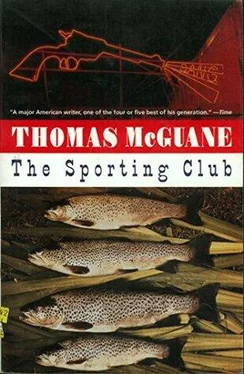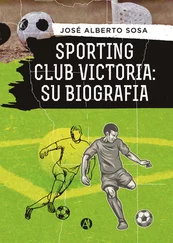Earl Olive’s group seemed to have fun. The Centennial Club seemed to have none at all. Between the two there was something like a magnetic field. Two horseshoes faced each other and in between were many wavy lines. Perhaps it wasn’t a magnetic field between the two groups. But there was a strong sensation of these wavy lines.
Then Fortescue stepped forward, forthright in his twills, and called, “Earl?” Quinn wondered who would get Fortescue’s tin soldiers when he died.
“Howdy.”
“What about keeping the noise down?”
“Let’s keep the noise down!”
“And, oh, Earl—”
“Can I help you?”
“This other business—” He indicated the couple at the trees. “We’ve got ladies here.” Fortescue turned an open hand behind him to draw attention to the club’s womenfolk, lined behind Fortesque like a cabinet of fire-axes in an institutional boiler room. The man in the see-through shirt stepped up his activity and was now a veritable dervish at the tree.
“Bobby, best cut it out. You’re making these folks horny.”
“What you got’s better,” the man called, gone quite mad in his threshing.
“Earl!” Fortescue’s reproach was no longer a secret.
“Caint stop, Earl! Caint stop!”
“Lucy!” Earl Olive called, pointing with a meat fork. “Can’t you make an escape?” He turned to Fortescue’s group. “He has been happy cuffin it for some many years we had no idea this could happen—” Scott took the lead.
“All right, kids,” he said to the club group. “This is a little rank. Desmond? Edith? Let’s go. Maureen, Janet? A little rank. Let’s go, kids. I’ll handle this.”
“Winkin?” said Earl Olive. “Blinkin, let’s go. Nod, are you coming?”
“I will want to talk to you,” said Fortescue.
“You are talking to me,” Olive said complacently.
Then Charles Murray, the Cincinnati lawyer, disengaged himself from the retreat and came back to the ring, and his short rapid stride seemed determined. He stepped before Earl Olive and, with his feet close together, rose slightly on his toes, at the same time holding up the folded tortoise-shell glasses as though they were a writing instrument and he were going to make a single, clear mark on a sheet of paper. “You,” he said, “shall feel the full weight of my displeasure. I will remember this.” Earl Olive looked at him, delighted.
“Okay, Heidi,” he said, “you do that.” Quinn tried to comprehend how it was that Charles Murray went away; but it wasn’t quite like anything he had ever seen before. Without turning from Earl Olive, all of him seemed to rise in a low rearward arc, rising on his toes, retreating hands rising too as though they would sustain him in some low batward menace of going off. He was only walking away.
“Gee,” said Janey, “that looks bad.”
* * *
At his rare best, Stanton had the uncomplicated goodness of those who can talk to strangers. One knew that at his worst he was a joker and, to that extent, demonic. But at his best he had a simplicity that was not Quinn’s and that Quinn envied, an ability to walk into the middle that Quinn, the calculator, lacked.
So Stanton led and Quinn followed with Janey on his arm. Stanton introduced himself all around, smoothly overriding country reticences, and then introduced Quinn and Janey to each of them flawlessly. He began, after that, to quip with Earl Olive as though from acquaintanceship immemorial.
“Where’s my dinner, Earl?”
“Shit.”
“What you done with my God damn dinner?”
“Sheeyit.” Earl looked over his shoulder from the fire. “Bobby, these folks wont some fuckin beer.” Bobby brought three cold Pabst Blue Ribbon beers.
“Thank you,” said Janey in a high voice. Now the others approached the fire warily. One girl stared at the side of Quinn’s face until he looked over; and her smile which had been halfway up went all the way up. “Hi.”
“Hi.” Quinn swigged back half his Pabst Blue Ribbon. He hadn’t been introduced to this girl. Now Earl was smiling at him.
“Good, huh?”
“You bet,” said Quinn, smacking his lips just like in the advertisement: Say! That’s good! And! It doesn’t fill me up!
“Gimme a sip,” said the girl, her yummies making rather a good thing of her short-sleeved pink sweater. Quinn gave her the can. She tilted it to her mouth a moment and handed it back. It was empty.
“All kidding aside,” Stanton was saying, “we already ate, Earl. You just go on and make pigs of yourselves. We don’t mind.” Earl’s arms fell to his sides, his chin to his chest; he commenced to jiggle all over.
“You tickle me,” he managed, “I swear you do!”
* * *
“Jim,” Quinn answered. “Jim Quinn. What’s yours?”
“Lu.”
“Hi, Lu.”
“Hi.”
Lu had a short little skirt of aniline blue that exposed the dimply legs. She wore low, fur-lined après-ski boots that Quinn ignored: the ski shops introduced a misunderstood element into the North.
The sun going off took the color out of Earl Olive’s fire and it burned pale as frost under the skewered meat. Earl had one hand plunged far into his pocket while the other delicately rotated the skewer. Stanton told him the only way he’d eat anything he cooked was if it was drowned in ketchup and if he could chase it with a quick fifth of Pepto-Bismol so it wouldn’t repeat on him. Earl Olive heaved all over and said my God you tickle me, oh Jesus.
“So what is it you do anyway?” Lu asked.
“I make parts for cars.”
“Like what kind of parts for cars.”
“Triangular ones with holes in them.”
“Yeah? Wow. Is it hard?”
“Not at the moment.”
“You guys sure,” Earl called, “that you don’t want any meat?”
“Positive.”
Janey came up. “Would you get me a beer?” she whispered. “Vernor drank mine.”
“What? Oh, sure. Here—” Quinn went to an open cardboard box and fished out two more Pabst Blue Ribbons.
Bobby stepped over, a beer in his hand curled up close to his chest. “Lemme crack them bastards for you.” He had an opener on a long silvery cable attached to one of his belt loops. He opened the two beers and gave them to Quinn. Quinn thanked him and handed one to Janey.
“Thank you,” she whispered, made one slice of her eyes toward Lu and rejoined Stanton. Quinn thought: what does she see? What does Janey see?
Meanwhile, Bobby and the fat girl got on the Harley-Davidson and began driving through trees and brush. Lu explained that this was called “gardening,” tearing up the earth, a sport developed during the war by teenagers who specialized in the highspeed wiping out of victory gardens by the skillful use of the power slide. Quinn nodded, listening first to her and then to the snarl of the motorcycle working its way up and down the hill through the ferns herbivorously, making purposeful back-and-forth casts so that when it wasn’t on top of the hill and quite dark against the sky, it was below and all that was visible were the twin ovals of flame at its tailpipes. Still, above the rude exhaust came the fat girl’s wild, loony cackle. Stanton came over. “How do you like that?” he asked. The motorcycle was now swiveling and skidding up the hill toward them.
“I guess I don’t.”
“What! Where is your sense of history? The bumpkin is motorized. It could have been exactly the same in the beloved Middle Ages where everything begins, dueling, everything. Look: you still have the peasant in his leather jerkin. Only now he’s on a motorcycle instead of his wife’s ass—” Janey looked up at him and he didn’t return her glance.
“Hey!” said Lu. “There’s ladies present!” She smiled at Janey and Janey smiled back with delicate strain. Quinn opened another beer.
Читать дальше












